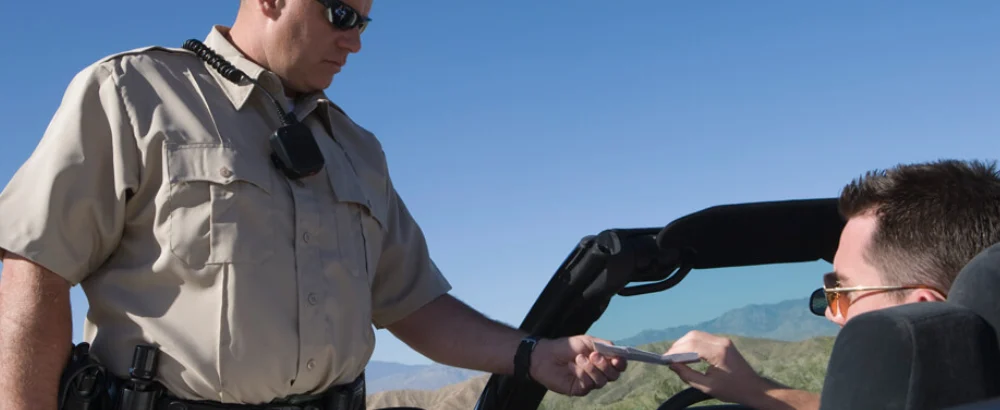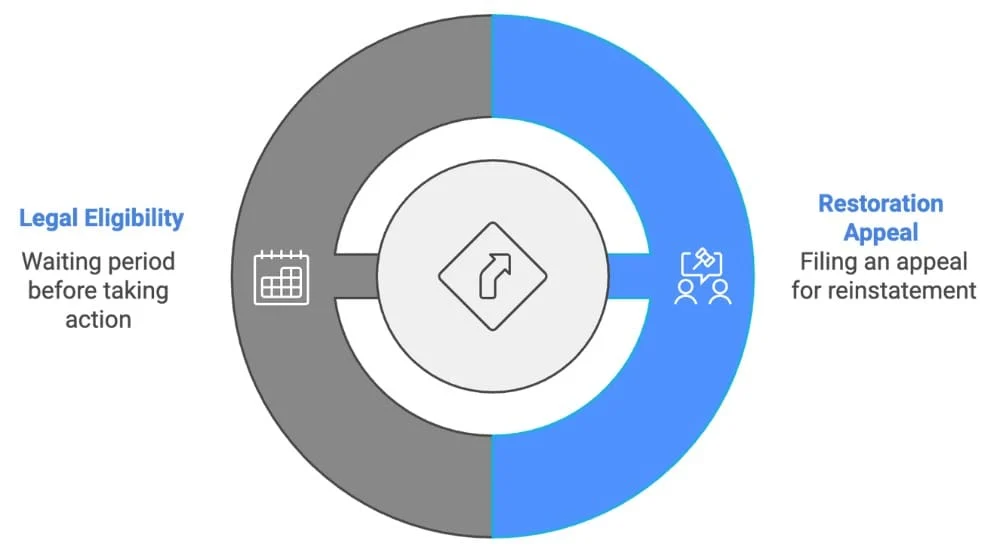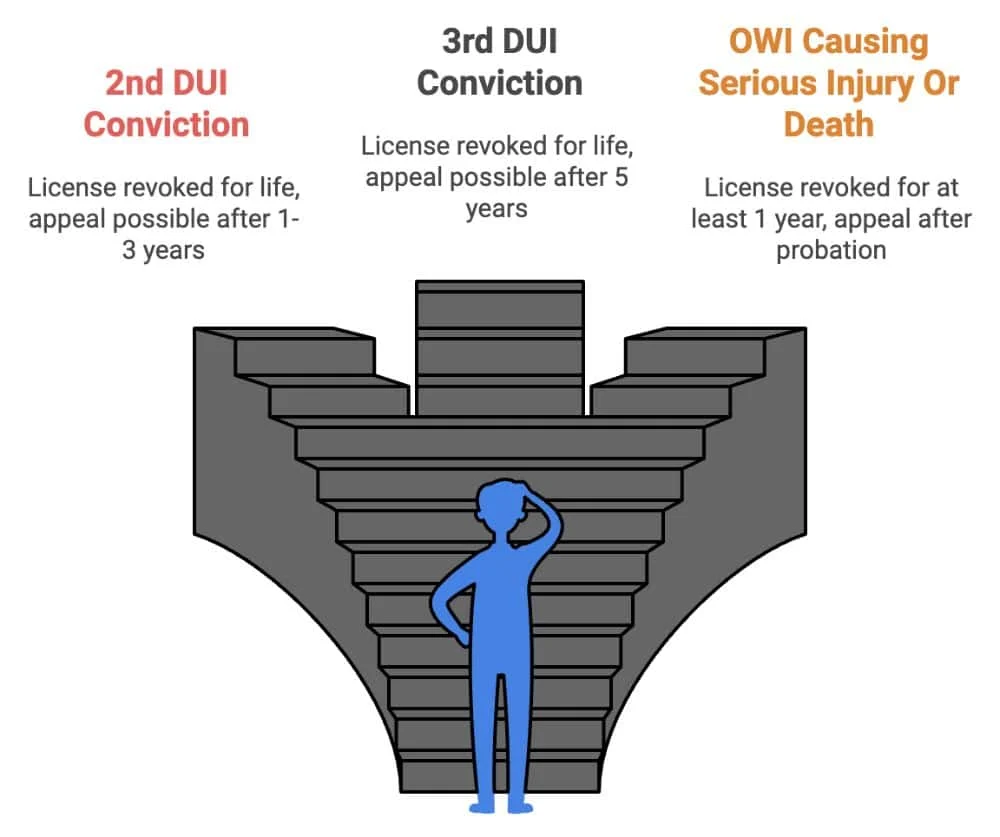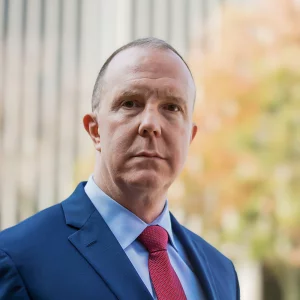No, jail time is NOT mandatory. However, anyone facing a 2nd offense DUI is at serious risk of doing some time. This is why it’s important to have a genuine DUI law firm, like ours, who knows exactly how to avoid or at least minimize your exposure.
Michigan DUI Second Offense Driver’s License Penalties

Key Takeaways
- A second DUI conviction in Michigan leads to mandatory license revocation, with no exceptions by a judge.
- Restoring a revoked license requires filing and winning a formal appeal with the Michigan Secretary of State.
- Michigan law classifies a second DUI offender (within seven years) as a “habitual alcohol offender,” requiring counseling and proof of sobriety.
- Participation in a Sobriety Court program may provide a restricted license but comes with strict sobriety requirements.
In our work as Michigan DUI lawyers, we answer a lot of questions about this. Accordingly, the purpose of this section is to emphasize the importance of what happens to your driver’s license in a 2nd offense Michigan DUI case.
Under Michigan law, if you are arrested for and then subsequently convicted of a second Operating While Intoxicated (OWI) offense within 7 years of any prior DUI conviction, your driver’s license will be revoked. This is an automatic and legally required penalty.
Unlike penalties such as community service or a jail sentence, a judge has no power to alter license consequences in any way. The mandatory license revocation for a second offense DUI is automatically imposed by the Secretary of State.
A license revocation is far more serious than a mere license suspension.
“Revoked” means taken away for good, and that’s just the beginning…
What Happens to My License After a Second DUI Offense?
- When your license is revoked for a 2nd offense DUI, it is taken away for life.
- This means that until and unless you win a formal driver’s license restoration case through the Michigan Secretary of State, you won’t get your license back, no matter how long you wait.
Under Michigan’s DUI laws, if you are convicted of a 2nd offense, you must wait AT LEAST 1 full year before you can even begin the process of asking for it back. In practice, a person will generally have to wait closer to 3 years to file a license appeal. This is because the law requires demonstrating a period of voluntary sobriety, meaning sober time accumulated after probation has ended.
What is a Revoked Driver’s License?
When a driver’s license is revoked, it’s about the same thing as being expelled from school. The only way to ever get a revoked license back is to file – and win – a formal driver’s license restoration appeal.
Thus, just as a suspended student is still a student, a driver with a suspended license still has a license, even though both are temporarily sidelined.
By contrast, a driver whose license has been revoked has no license whatsoever, just like someone who has been expelled from a school is no longer a student there.
Michigan Driver’s License Was Revoked Or Suspended?
Ready to Drive Again? Let’s Restore Your License – Guaranteed!
What is a “Habitual Alcohol Offender” Under Michigan Law?
It is very often when anyone facing a second OWI will divide themselves into one of two very different camps:
- Those that accept that their drinking has become a problem, and
- Those that don’t.
We’re not here to tell anyone that they have a problem or not, but a person facing a 2nd DUI offense needs to know that, as noted above, in these cases, the courts and the Secretary of State automatically presume that a drinking problem exists.
Does a Second DUI Make You a Habitual Traffic Offender?
In fact, under Michigan law, if you pick up a second DUI within 7 years (or 3 within 10 years), you are considered a “habitual alcohol offender.” It is precisely this “habitual offender” status that results in the license revocation.
It is also this automatic designation as a “habitual offender” that requires the Judge to order a person into counseling.
For a person to get through this, they’re going to have to understand and accept three things:
- When you’re convicted of a 2nd offense DUI, your driver’s license will automatically be revoked,
- You are presumed – by law – to have at least some level of problem with alcohol, and,
- That you have become a demonstrated risk to the public behind the wheel.
Can You Get Your Michigan Driver’s License Back After It Has Been Revoked For a DUI?

Yes, after a second DUI offense, you can recover your revoked driver’s license. However, there are important steps you need to take to do so. To reinstate driving privileges after your driver’s license has been revoked, you must:
- Wait until he or she is legally eligible.
- File a formal driver’s license restoration appeal case seeking reinstatement.
The only way around this is to get into a Sobriety Court program while the 2nd offense DUI case is still pending.
The simple high-school example from above works best here to explain the difference between having your license revoked as opposed to merely having it suspended:
Example: If you are a student and you wind up being suspended from school, it will be for a certain number of days, as in “from Monday, February 1, through Friday, February 5,” or something like that. In this example, you are due to return to school on a date certain (i.e., on Monday, February 5).
When a person’s driver’s license gets suspended, there is always a “from-to” date.
Application: If your license is revoked, it’s like being completely expelled from school instead of merely suspended. Someone who has been expelled is taken off the register and is no longer considered a student at all.
To get back into school, he or she must formally apply to be readmitted.
What Are The Chances of Jail Time for a Second DUI Offense?
You may not be required to go to jail for a second DUI offense, but it is highly likely. A second DUI offense in Michigan comes with serious legal consequences. While the exact sentence depends on the circumstances of your case, courts and prosecutors often view repeat offenders as a greater risk to public safety, which can lead to harsher penalties. Many people consider five days in jail to be the standard for a second DUI offense, but you may face jail time up to one year, depending on other factors considered by the judge.
Factors That Can Affect Jail Time for Second DUI Offenders
- BAC level: If your BAC is higher, then it is more likely that you will face jail time. The higher the BAC, the less of an excuse the driver has for driving.
- Previous DUI Convictions: Depending on the timing and circumstances of your last DUI offense, your chance of jail time may be affected. Typically, two convictions in a short period of time would result in a higher chance of jail time.
- Cooperation with law enforcement: Those who are cooperative with the officers at the time of the DUI arrest are often less likely to face jail time.
- Any minors being in the vehicle: A judge could see it as a form of child endangerment if any minors were in the vehicle at the time of the DUI arrest.
- Accidents: Causing accidents resulting in property damage can increase your chance of jail time.
- Injuries/Manslaughter: Your chance of jail time will likely increase if you were in a car accident that injured or killed someone. A manslaughter conviction in Michigan can result in prison time of up to 15 years, according to MCL – Section 750.321.
If these factors are present in your case, do not give up! Consult your Michigan DUI defense attorney to see how you can decrease your chances of jail time after a second DUI offense.
Can I Get a Restricted Driver’s License After a Second Offense DUI Charge?
A Sobriety Court Can Issue a Restricted License. This is huge in the world of DUI offenses. Many repeat offenders with prior convictions who are facing 2nd or 3rd offense drunk driving charges can apply for admission into a Sobriety Court program. In short, a sobriety court program is authorized by the State of Michigan to provide intense counseling and/or treatment to help someone quit drinking and stay sober.
As a reward for participation in and the completion of a Sobriety Court program, the judge can override the mandatory license revocation and issue a restricted license that gives the person driving privileges.
But here’s the catch: There aren’t as many open Sobriety Court slots as there are candidates for them, so the admission process is all about making sure an applicant is genuinely serious about getting (and staying) clean and sober.
Not all jurisdictions have a Sobriety Court program, but in our roles as DUI attorneys, my team and I have successfully transferred plenty of second-offense and third-offense drunk driving cases from courts that don’t have them to those that do.
We have even managed to transfer cases across county lines, as well, to make it possible for someone to participate in a Sobriety Court program who would not otherwise have been able to do so.
A Sobriety Court can order a restricted license, but the law requires the person to use an ignition interlock (technically called a “Breath Alcohol Ignition Interlock Device, or “BAIID” for short).
Anyone who gets a Sobriety Court license will still have to go through the formal driver’s license restoration process later on in order to remove the interlock and get a “full” license.
Sobriety Matters and the Michigan Driver’s License Restoration Process
The most important thing to understand about facing a 2nd offense DUI and the only way around the legally required revocation is to get into a Sobriety Court program.
If an individual facing a 2nd offense DUI does not get into a Sobriety Court program (and there are multiple reasons why that may happen), then there is no way to avoid the mandatory license revocation upon conviction for a 2nd offense DUI.
If a person does not get into and complete a Sobriety Court program, for whatever reason, then he or she will have to wait until eligible to file (and win) a formal driver’s license restoration appeal case before the Michigan Secretary of State.
The Driver’s License Restoration Process in Michigan
First and foremost, the whole point of a license appeal is to make sure a person has given up drinking for good and therefore poses no risk to ever drink and drive again.
Accordingly, and to win a license appeal, a person must prove, by what is defined as “clear and convincing evidence,” 2 key things:
- First, that his or her alcohol problem (under Michigan law, anyone with two or more OWI convictions is legally presumed to have some kind of drinking problem, which is a key reason for the revocation of his or her driver’s license) is “under control.In short, a problem is considered “under control” when a person can demonstrate COMPLETE ABSTINENCE from alcohol for a “legally sufficient” period of time. The exact amount necessary varies from case to case. Our firm generally requires someone to have been completely alcohol-free for at least 18 months before we move forward with a driver’s license restoration appeal.
- Second, that his or her (remember, legally presumed) alcohol problem is “likely to remain under control.” In practice, this requires showing that one has both the ability (i.e., “tools”) and commitment to remain alcohol-free for good.Put another way, a person must show that he or she is a safe bet to remain sober for life. This means demonstrating both a sober lifestyle and the intention to never again consume alcohol or use any drugs (including recreational marijuana).
License restorations are a complex area of the law. If the reader is interested, he or she should explore the subject area on this website’s blog, which has hundreds of detailed and informational articles explaining every facet of the Michigan license appeal process.
Were You Charged With A DUI In Michigan?
Your Best DUI Defense Starts Here. We’ll Protect You and Your Future.
Your Driving Privileges Depend On Your Sobriety
All of this means that before you have any chance of winning a driver’s license restoration appeal, you first have to be sober.
This, of course, can be a shock to some people facing a second DUI.
The bottom line is that anyone who refuses to acknowledge that they have a drinking problem will have a hard time getting through their 2nd offense DUI case unscathed.
Moreover, that kind of denial will ensure that he or she will never get their license back until they have a change of thinking.
Are Ignition Interlocks Required With a Restricted License
The Secretary of State, for its part, grills everyone who files a license appeal about having quit drinking for good before it will even consider giving them back any kind of driving privileges.
Even then, a person will have to drive for at least the first year on a restricted license with an ignition interlock unit installed in his or her vehicle.
Likewise, all driving privileges granted through a Sobriety Court program require use of an ignition interlock, as well.
Timing of the Driver’s License Appeals Process in Michigan
In practice, the license appeal process can’t be started (at least with any chance of winning) for the better part of three years from the time of a 2nd offense DUI. Therefore, what a person does in that 2nd offense DUI case to address what the court (and later, the Secretary of State) sees as their alcohol problem will ultimately take center-stage in their license appeal.
It comes down to this: In a 2nd offense case, the Judge is required, by law, to order some kind of counseling and/or treatment. You can gripe about it all you want, but if you just sit there and complain, you’re going to be sent to whatever counseling program the court is sending people to at the time.
With a Sobriety Court license, a person will be able to get during this time.
Even if you don’t get into a Sobriety Court program, though, it’s far better to be proactive and get into a counseling or treatment program of your own choosing, rather than just be ordered into something you may hate (and must pay for). This can be very helpful later, when you file a license appeal.
Penalties for Additional DUI Offenses Under Michigan Law

Although our focus here is on offense DUI’s, the penalties imposed depend on the timing of convictions in all 2nd offense and 3rd offense and OWI cases. To be specific, license penalties (unlike the DUI charges) are imposed solely based upon conviction dates.
Here is how it all breaks down:
- 2nd DUI conviction within 7 years from a previous: License revoked for life. Cannot file license appeal for at least 1 year (although as noted above, a person will likely have to wait closer to 3 years to have any real chance of winning)
- 3rd DUI conviction within 10 years of 2 priors: License revoked for life. Cannot file license appeal for at least 5 years.
- OWI causing serious injury: License revoked for at least 1 year. However, as we’ve observed, a person will have to wait until probation or parole is over, and he or she has accumulated a sufficient period of voluntary sobriety.
- OWI causing death: License revoked for at least 1 year. However, in death cases, a substantial period of incarceration is very likely. Given the requirement to prove a sufficient period of voluntary sobriety, there is almost no chance of winning a license appeal until one has been off probation or parole for at least 12 months (and perhaps longer).
Why Work With Jeffrey Randa and Associates After a Second DUI Offense
We are full-time Michigan DUI lawyers and driver’s license restoration attorneys. Every day we are in the courts of Wayne, Oakland and Macomb Counties defending misdemeanor and felony drunk driving charges.
Our law firm concentrates specifically in DUI and driver’s license restoration cases. We are genuine Michigan DUI defense lawyers. In that regard, we typically handle more first offense, second offense, and third offense DUI cases in any given month than most lawyers will ever see in an entire career.
Anyone facing a second drunk driving offense needs to have a real DUI lawyer evaluate all the evidence. Doubts about probable cause to make an arrest and/or a person’s bodily alcohol content can undermine a case. To produce the best results possible, the defense attorney needs to come up with a good OWI defense.
Even if the case strong enough to NOT be dismissed outright, the goal of every DUI defense is always to avoid as many of the legal penalties and negative consequences possible when facing an OWI offense. This can include, but is certainly not limited to, getting the client into a Sobriety Court program.
Be Proactive About Your Second Offense DUI Case
If you are proactive, and find a decent counseling or treatment program beforehand, that be used as a bargaining chip and help the outcome of your 2nd offense DUI case.
It can also be helpful to show that you’re serious about wanting the kind of help that a Sobriety Court program offers.
In addition, being proactive in this way will pay huge dividends down the road, when it’s time to gear up for a formal license appeal.
The value of having started counseling early on is hard to overstate in the context of both a 2nd offense DUI and a license appeal case.
My team and I are uniquely qualified to help in this regard. Because of our roles as driver’s license restoration and DUI lawyers, we really understand recovery, and can offer guidance to our clients as they explore their various counseling and/or treatment options.
Sobriety Court or Treatment Programs Can Help with Licence Restoration After a Second DUI Offence
Unless you’ve completed a Sobriety Court program, it’s rather hard to convince the Secretary of State that you took your 2nd DUI as a true “wake-up call” when you didn’t do anything other than wait around to go to whatever program the court ordered as part of your criminal case.
On the other hand, and as the old saying goes, “actions speak louder than words.” If you took the initiative and found your way into a good counseling or treatment program before the court shipped you off to one of its choosing (and doing this, by the way, puts you in control of things like how often and where you go to counseling, and how much it costs), then you’ve already got a head start.
That’s where our firm can really help make things better. As you explore your options, make sure you give our office a ring.
All of our consultations are free, confidential, and, best of all, done over the phone, right when you call.
Contact The DUI Defense Team At Jeffrey Randa and Associates
My team and I are very friendly people who will be glad to answer your questions and explain how things work. We’ll even be happy to compare notes with anything some other lawyer has told you.
We can be reached Monday through Friday, from 8:30 a.m. until 5:00 p.m. (EST), at 586-465-1980.







